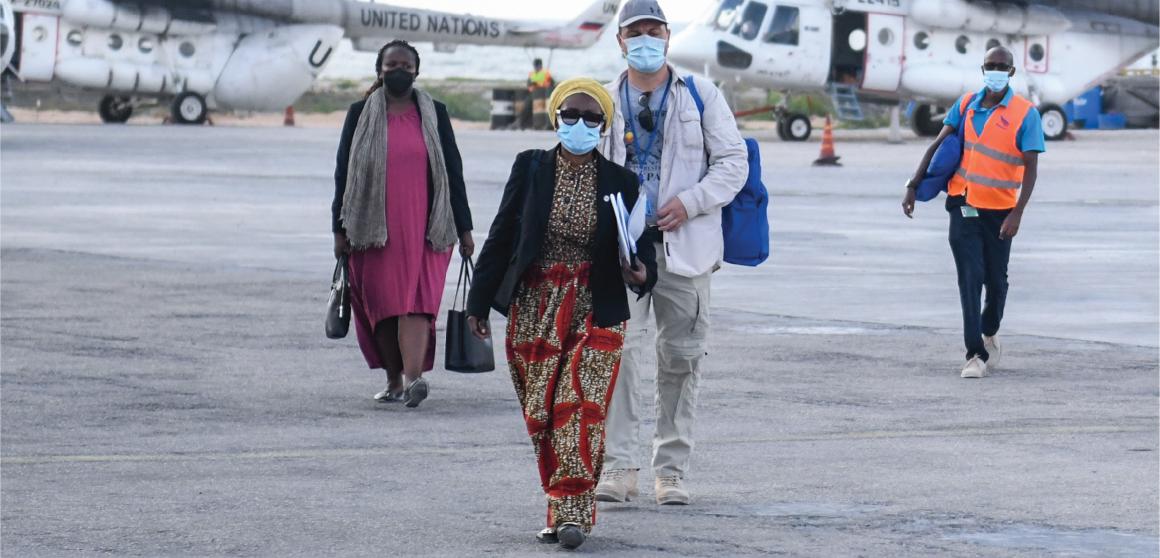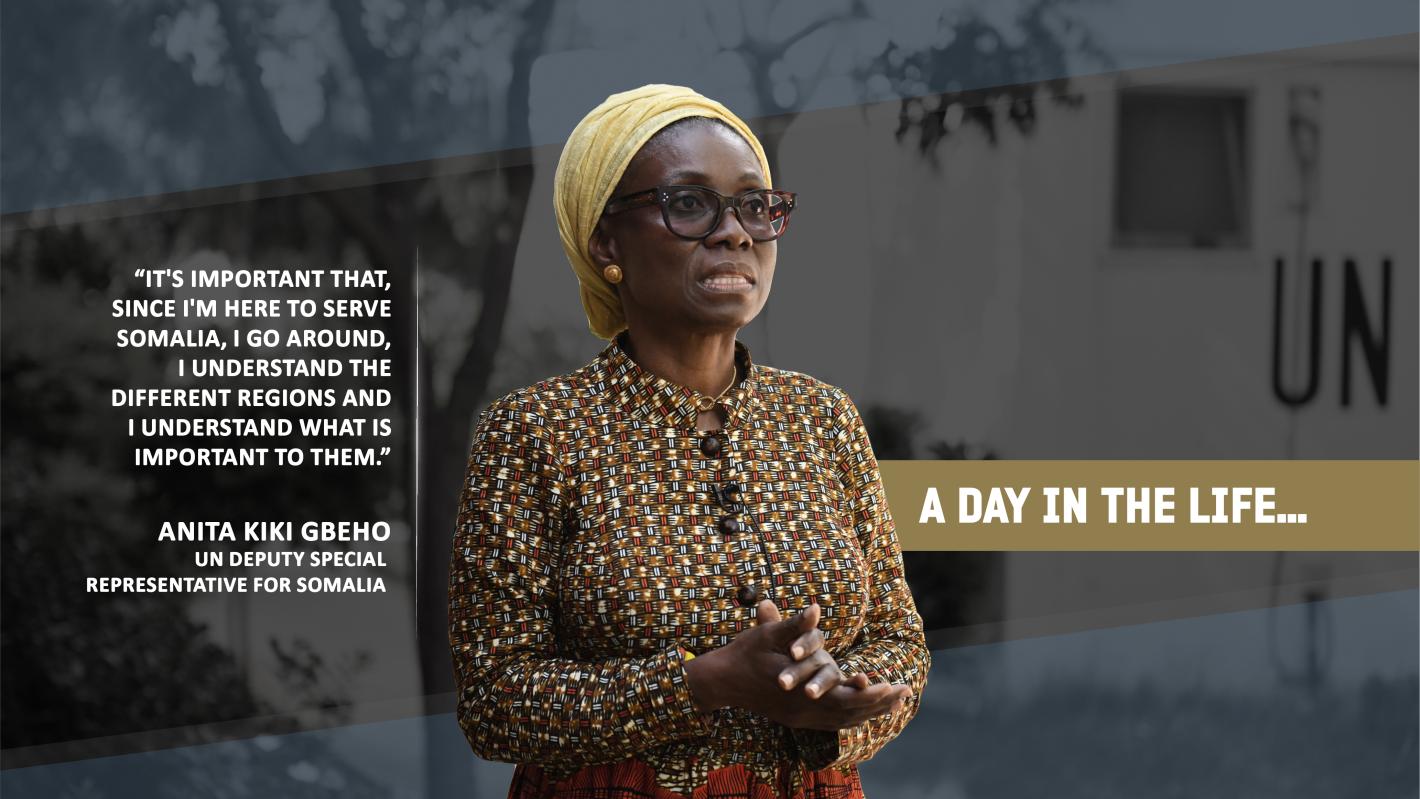Anita Kiki Gbeho is a long-serving staff member of the United Nations, having served under the blue flag for more than 25 years.
Eight months ago, she joined the world body’s operation in Somalia, where she serves as the UN Secretary-General’s Deputy Special Representative. Ms. Gbeho oversees the work of the political, human rights, electoral, rule of law and security components of the UN Assistance Mission in Somalia (UNSOM), in addition to supporting the Special Representative in managing the Mission.
Her past experience includes assignments at UN Headquarters in New York, as well as in conflict and post-conflict environments such as Angola, Cambodia, Iraq, Namibia, and Sudan. She also has previous experience with Somalia through her work with the UN Office for the Coordination of Humanitarian Affairs (OCHA) from 2007 – 2012.
Somalia’s security situation can unfortunately impose limitations on the ability of UN officials to freely move about. However, when an opportunity to get up from behind a desk or from a conference room arises, they seize it. Interacting with different parts of society helps them get a better understanding of the people they serve.
The following photo story provides a snapshot of one of these opportunities.
TUESDAY, 19 OCTOBER 2021

07:00 a.m. – On the tarmac in Mogadishu: The day begins early for the UN Secretary-General’s Deputy Special Representative for Somalia, Anita Kiki Gbeho, and her small delegation. They are up bright and early for a UN flight to Kismayo, the interim capital of Somalia’s southern-most Federal Member State, Jubaland.
On this visit, she is scheduled to meet Jubaland’s leadership, electoral authorities, and civil society groups. She’s keen to get going.
“It's my first visit to Kismayo. It's important that, since I'm here to serve Somalia, I go around and visit the different regions and I understand what is important to them,” Ms. Gbeho says.

07:30 a.m. – In the air over Mogadishu: The UN flight climbs to cruising altitude and then begins making its way to Kismayo. The occasion provides an opportunity to catch a birds-eye view of the Somali coastline. However, for Ms. Gbeho it’s another chance to read through and revise various reports and other documents ahead of her meetings on the ground.


09:05 a.m. – Security briefing: Shortly after landing, local UN security staff provide Ms. Gbeho with a security briefing ahead of her transport to the city of Kismayo, some 11 kilometres away from the airport.

10:00 a.m. – Meeting the President: Ms. Gbeho’s first meeting of the day sees her taken to the Jubaland State House, where she meets with President Ahmed Mohamed Islam ‘Madobe.’ Her agenda includes the issue of women’s participation in the country’s electoral process, especially the efforts to ensure the minimum 30 per cent quota for their representation in parliament and, in that respect, she receives a welcome surprise.
“One of the issues I had wanted to raise with the President was the issue of women’s participation in the Upper House process. He beat me to it! He announced – we are very pleased to have heard the news this morning – two seats will be reserved for women, and of the two remaining seats, a woman will be competing for one of the seats. So good news coming out of Jubaland this morning,” Ms. Gbeho says.

11:00 a.m. – Meeting with electoral authorities: Once her meeting with the president is over, the UN official goes straight into her next encounter at the State House, this time with the chairperson of the State Electoral Implementation Team (SEIT), Siyad Mohamed Mursal.
“This is a time when we’re smack in the middle of the [electoral] process, and we wanted to ensure that the Upper House process is finalized here in Jubaland and then we move on to the House of the People process,” Ms. Gbeho says.
Jubaland was the first of Somalia’s Federal Member States to start holding Upper House elections. Four seats had already been filled, and the administration announced early on the day of the visit that the elections for the remaining four Upper House seats would be completed later that week.

12:00 p.m. – Driving through Kismayo: With her meetings at the Jubaland State House complete, Ms. Gbeho and her team drive to the UN offices through the city of Kismayo, which has a history going back to antiquity and is currently home to an estimated few hundred thousand residents. During the civil war in Somalia, the city was the site for heavy fighting, at one point being occupied by Al-Shabaab for several years before being retaken.

12:30 p.m. – Arriving at the UN Compound: Around a dozen kilometres outside of Kismayo is the regional UN Compound, home to both UN staff members and AMISOM forces. Arriving there, Ms. Gbeho is greeted by local colleagues.

12:40 p.m. – Working lunch: In order to maximize her time on the ground in Kismayo, Ms. Gbeho’s lunch is a working lunch, enabling her to hear first-hand from staff about the work being done by the United Nations in Jubaland in various areas, including support for the rule of law, elections and human rights, as well as to get their views on the various challenges being faced and updates on progress being made.

01:20 p.m. – Time for a photo: Given their workloads, it’s not every day that staff in field offices get to discuss their work directly with senior officials – and with Ms. Gbeho having been in their shoes in earlier stages of her career, in remote locations, she understands the difficult working conditions they operate in, and appreciates their enthusiasm. Consequently, a request for a group photo is never too much trouble.

01:30 p.m. – Time to move: But time is tight. Not long after her meeting with staff, Ms. Gbeho is whisked away to her next meeting: with representatives from local civil society groups. UN compounds are frequently being reconstructed to accommodate new structures and repair old ones, and the compound in Kismayo is no exception.

01:40 p.m. – Meeting with civil society: In addition to meeting with officials from government and other institutions, UN officials are always keen to meet with civil society given the vital role they play in local communities, especially those in conflict or post-conflict settings.
“I specifically asked to meet civil society because I believe they're the other side of the coin. As a political mission, most of our work tends to be with governments and tends to be with those who make the rules that govern our work moving forward,” Ms. Gbeho says.
“Civil society representatives are the ones on the sharp edge; those are the individuals who are dealing with people on a day-to-day basis,” she adds. “Engaging with them helps to get some ground truths and helps me understand whether or not we’re having any effect. It helps us understand what they believe is important to Somalis because, ultimately, everything that we’re doing is about Somali people.”

02:40 p.m. – Time for photos: Schedules rarely go to plan and there are always attempts to build in some extra time for the unexpected. This comes in handy for after the meeting as Ms. Gbeho is asked to take part in a round of photos.

3:00 p.m. – Communicating: Lights, action, camera! The United Nations is there to serve the people of Somalia and part of that entails communicating what it does to the general public so as to help improve understanding and acceptance. Here, Ms. Gbeho does a brief on-camera interview for a UN communications team which will then produce a range of products to be disseminated to Somali and international audiences.

03:20 p.m. – Departure: With her meetings over, Ms. Gbeho speeds back to the airport in Kismayo where she and her delegation board the waiting Antonov An-26-100 for the noisy flight back to Mogadishu.

04:50 p.m. – Return to Mogadishu: Some 90 minutes later, the UN flight is parked on the tarmac and Ms. Gbeho disembarks after a long day with a tight schedule, but still productive and enlightening.
“I always wish there was additional time to meet more people and hear from them about what the United Nations could and should be doing to help them,” she says. “So, while these sorts of visits are quick and packed, they still help me to get a better sense of how we can best support Somalis and that’s important to my work and that of my colleagues.”

05:20 p.m. – Work continues: Upon returning to the UN compound in Mogadishu, it is not a case of returning to her quarters to unwind after a long day. Far from it, in fact. Instead, Ms. Gbeho returns to her office to take stock of her visit to Kismayo, as well as catch up on other pending work. Still, no complaints from this UN official.
“I come from a humanitarian-development background and that makes my approach personal and also gives me an understanding of our approach as an institution, making sure what we do is people-centred. It's about the people we serve,” she says. “The day you forget it's about people is the day I believe we would have lost our way. So, for me personally, and as a representative of this organization, it's important to get up from behind my desk and interact with the people that we serve.”
View more photos from this visit here.






